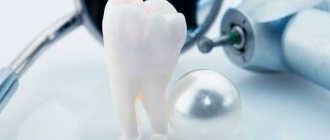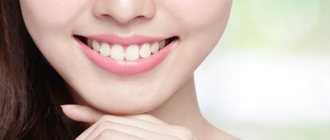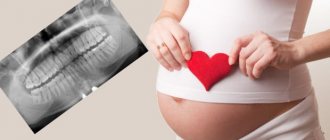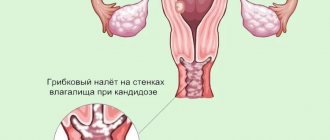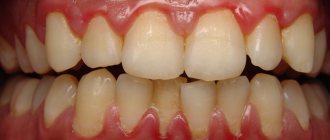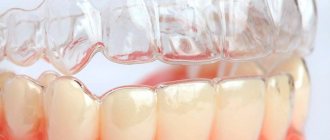Toothache during pregnancy can be caused by various factors, the cause of which must be determined immediately at an appointment with a dentist.
A woman’s body is especially vulnerable during this period; tooth pain is a signal of the onset of a pathological process, which can be dangerous not only for the mother, but also for the unborn child.
The best prevention of toothache in pregnant women is to visit the dentist during pregnancy planning and perform oral sanitation. Sanitation helps to identify and treat diseases of the teeth and oral mucosa in a timely manner. Having thus prepared for pregnancy, a woman can visit the dentist for the next 9 months only for the purpose of a preventive examination.
If a toothache occurs, a pregnant woman should immediately consult a dentist, because we are talking not only about her health, but also about the health of the unborn baby.
Why does toothache occur so often during pregnancy?
Each woman’s well-being during pregnancy is purely individual. However, expectant mothers can really be bothered by such a problem as toothache. Women who have always had a perfect smile sometimes develop caries and gum inflammation, and frequent dental visitors note an exacerbation of chronic diseases. The fact is that pregnant women's teeth are really very vulnerable. Lack of vitamins and minerals, metabolic disorders in the body, changes in hormonal levels, increased acidity of the oral cavity as a result of toxicosis - all these are factors that can negatively affect dental health and provoke caries and toothache in pregnant women.
Whims or symptoms of gingivitis during pregnancy?
The first symptoms of gingivitis in pregnant women begin to appear between 8 and 12 weeks. Expectant mothers, as a rule, suffer from two forms - catarrhal and hypertrophic; ulcerative gingivitis develops less often.
Catarrhal gingivitis
This form of the disease is manifested by the formation of a fairly large amount of soft yellow plaque on the surface of the teeth, swelling of the gums, their soreness and significant bleeding when pressed with a sharp object. Catarrhal gingivitis is characterized by the spread of inflammation over the entire surface of the gums, sometimes the process affects the tissues of both the upper and lower jaws.
Hypertrophic gingivitis
The first symptoms of hypertrophic gingivitis usually appear no earlier than the twentieth week of pregnancy. Inflammation affects the lower jaw, gums in the area of incisors, canines and small molars. The hypertrophic form of gingivitis is characterized by an increase in the volume of gum tissue, an inflammatory process in it and bleeding. Gum pockets also appear - grooves formed between the tooth and gum due to the growth of gum tissue.
Ulcerative gingivitis
The most severe form of gingivitis occurs in pregnant women. It occurs against the background of serious health problems accompanying pregnancy, in the last trimester, or under the influence of stressful situations. The main signs of ulcerative gingivitis are severe itching, burning, bleeding of the gums, swelling and ulceration.
What symptoms should you see a doctor for?
Prevention is the key to health. Regular dental examinations every six months can save you from serious dental problems. Therefore, I recommend visiting a dental clinic both at the planning stage of pregnancy and during it. And if you are worried about, for example, toothache from cold and hot, you should immediately consult a dentist. The smallest carious cavity is a source of infection, which is an additional burden on the body of a pregnant woman. Moreover, if this caries is not treated on time, pulpitis may develop, accompanied by severe pain symptoms.
If possible, before visiting the dentist, consult with the gynecologist leading your pregnancy. Be sure to inform your dentist about your situation, and best of all, go to a clinic equipped with the necessary equipment and staffed with highly qualified specialists who can provide assistance without harming the expectant mother and child.
How does a painkiller pill work?
When inflammation develops in the infected pulp or periodontal tissues, they produce enzymes that signal problems - prostaglandins. Prostaglandins go to pain receptors - nerve endings, and “turn on” pain.
Analgesics block the release of signaling enzymes, so pain disappears some time after taking them. The cause of toothache is an infection or inflammatory process that is not eliminated, and unpleasant symptoms reappear after a while.
When is the best time to treat teeth for pregnant women?
The most favorable period for a woman and the safest period for a child for dental treatment during pregnancy is the second trimester. But, if you are suffering from toothache or there is a doctor’s prescription, measures can be carried out in the first and even in the third trimester (the only exception may be complex surgical operations). It is important that the expectant mother is as comfortable as possible during treatment. In our clinic, each office is equipped with a soft orthopedic chair and special lumbar bolsters, which allows you to comfortably carry out full treatment even in the third trimester of pregnancy.
What procedures are allowed during this period, and which are strictly prohibited?
Pregnancy imposes a number of restrictions on treatment, including dental treatment.
Acceptable:
- Treatment of caries, especially in the very initial stages. If the tooth is barely touched, you can even do without anesthesia. In case of increased sensitivity, use a spray with a minimal content of adrenaline.
- Fluoridation, enamel whitening. These manipulations are classified as absolutely safe procedures.
- Gum treatment. It can be carried out in any trimester using anti-inflammatory drugs.
- Installation of crowns and removable dentures. It will not harm either the expectant mother or the child.
- Removal of a tooth. At the level of modern medicine, it is considered a relatively safe manipulation for pregnant women, but it is performed in extreme cases
Forbidden:
- Dental implantation due to the need to take strong medications.
- Removing "eights". Severe trauma to the jaw occurs: a large wound surface can become a source of infection.
- Bite correction. During pregnancy, a woman's body loses a lot of calcium, so braces are likely to cause tooth decay. If pregnancy occurs already during treatment, it is interrupted until the birth of the child.
- Use of general anesthesia for pain relief.
Carrying out local anesthesia with special preparations containing a minimum percentage of adrenaline and calculating the correct dosages is not considered dangerous to the fetus.
How to relieve toothache during pregnancy?
What to do at home if your tooth hurts a lot? Today, obstetricians and gynecologists around the world allow women to take certain tablets for toothache during pregnancy. For example.
- Paracetamol
There is a stereotype that paracetamol is an exclusively antipyretic drug that is taken exclusively for ARVI and influenza. In fact, it has a pronounced analgesic effect, so it will help get rid of toothache. Moreover, despite the fact that the drug penetrates the placenta, it does not pose a threat to the fetus. - No-spa
But no-spa for toothache will not cause harm, but it will not be beneficial either. The thing is that drotaverine hydrochloride, the active substance at the heart of the drug, is an antispasmodic, responsible for relaxing smooth muscles. But it is powerless to have a pain-relieving effect. However, for women prone to self-hypnosis, taking No-shpa can bring relief according to the placebo principle.
What medications that we are used to in everyday life should not be taken during pregnancy, even with severe toothache? Firstly, analgin, which negatively affects the blood count, is prohibited. Secondly, you should not resort to Nurofen, which can cause oligohydramnios in a pregnant woman. Thirdly, drugs such as citramon or askofen are not recommended, since they contain a large dose of caffeine.
If we are talking about the need to relieve toothache during pregnancy in the conditions of treatment in the dentist’s office, then you should not be afraid that you will have to endure the pain. Only anesthesia using adrenaline, which can cause an increase in blood pressure, is strictly prohibited. But local painkillers based on mepivacaine or articaine will not cause harm.
In the early stages
In the first trimester of pregnancy (1-13 weeks), all organs and systems of the baby are formed. Medications during this period can disrupt the normal development of the fetus, so it is better to avoid them. But, if acute pain strikes you late or on a holiday, the doctor will prescribe:
Ibuprofen (Ibuprom, Nurofen), tablets
In addition to the analgesic effect, it also has an anti-inflammatory effect. Ibuprofen will help eliminate the symptoms of chronic pulpitis and inflammation of the ligaments of the tooth, periodontitis. 1 tablet contains 200 mg of active ingredient, and can be taken no more than 3 times a day.
For expectant mothers suffering from frequent attacks of heartburn, toxicosis or stomach pain, ibuprofen preparations are not suitable - they are made on the basis of propionic acid and irritate the gastrointestinal tract.
Dental drops
Contains essential oils of camphor, peppermint and valerian infusion. They have analgesic, anti-inflammatory and bactericidal effects. A cotton swab moistened with 2-3 drops is placed for 5-10 minutes in the tooth cavity destroyed by caries. This relieves pain from deep caries and pulpitis.
The use of dental drops requires precautions: if ingested, they can provoke an attack of vomiting, and if in contact with mucous membranes, cause a burn.
Gel Kamident
A combination of substances with analgesic (lidocaine), anti-inflammatory (chamomile) and antibacterial (thymol) properties. A drop of gel is applied to the root zone of the diseased tooth and rubbed in. The gel reduces sensitivity in inflamed gums, which helps reduce pain during gingivitis, stomatitis and periodontitis.
What is the prevention of dental diseases in pregnant women?
Following a few simple rules will help you avoid toothache during pregnancy. A woman planning to become a mother definitely needs to see a dentist and undergo a complete sanitation of the oral cavity, that is, to cure all her teeth and put her gums in order. Already during pregnancy, first of all, it is necessary to adhere to a balanced diet and additionally take a complex of vitamins and minerals recommended by the doctor. You need to be especially careful about your oral hygiene: it should include not only regular brushing of your teeth with a brush and toothpaste, but also the use of interdental floss. During pregnancy, it is important to see a dentist: it is advisable to visit the clinic at least twice during the 40 weeks of pregnancy.
Recommendations to help avoid problems
In order not to become one of the pregnant women suffering from gingivitis (and, according to statistics, there are more than 60%), you must adhere to simple rules.
- Carry out the necessary hygiene procedures regularly: brush your teeth using a toothbrush with soft bristles, and do this as thoroughly as possible, use floss and antiseptic rinses.
- Avoid excessive amounts of sweets and consume sweets, chocolate and cakes in moderation. It is strongly recommended to refrain from chewing toffee and caramel, since the remains of viscous delicacies can accumulate in the periodontal space of swollen gums, provoking particularly active proliferation of microorganisms.
- Eat more vegetables and fruits, paying special attention to foods containing vitamin C.
Treatment of gingivitis in pregnant women cannot be postponed until later. Occurring due to changes in hormonal status and the growth of microbial microflora, it provokes even more active proliferation of bacteria, which in the most severe cases can cause intrauterine infection of the fetus.
How to treat?
Gum treatment should be done in dentistry. First of all, you need to establish an accurate diagnosis, with a 90% probability that it will be gingivitis. This pathology is typical for pregnant women. First, you need to professionally clean the enamel from plaque and remove hard deposits using ultrasound. Don't worry, it's completely painless and not contraindicated when carrying a child.
In most cases, to eliminate the pathological process, you have to resort to drug therapy. The doctor prescribes only those drugs that are approved for use during pregnancy. Oral rinses with antiseptic solutions such as Miramistin are usually prescribed. Applications with anti-inflammatory plates are also indicated, and sometimes wound-healing ointments for topical use are indicated. In more serious cases, antibiotics may be needed.
Additionally, it is recommended to rinse the mouth with decoctions and infusions of medicinal herbs. Chamomile, sage or St. John's wort will do.
Preventive actions
To protect your oral health while bearing a child, you need to follow a number of preventive measures:
- During toxicosis, try to drink more water to maintain optimal microflora in the oral cavity.
- After eating carbohydrates, try to brush your teeth or use mouthwash.
- Buy toothpaste with extracts of medicinal herbs aimed at strengthening gums.
- Avoid eating foods that are too hot to avoid getting burned.
- Do not self-medicate. If you have problems with your gums, be sure to see a dentist.
- Massage your gums every day. An excellent massage effect can be achieved using an irrigator or finger pads. Such measures prevent stagnation and improve blood circulation in the gums.

